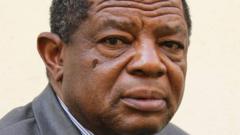The political landscape of Zimbabwe has been shaken as a rising faction within the ruling Zanu-PF party is embroiled in accusations of corruption and leadership ambitions. Veteran war hero Blessed “Bombshell” Geza has vocally opposed President Emmerson Mnangagwa's grasp on power, raising alarm during a time of military drills across Harare.
### Zimbabwe's Political Turmoil: The Rise of "Bombshell" Geza

### Zimbabwe's Political Turmoil: The Rise of "Bombshell" Geza
In the midst of military drills and internal party conflict, Zimbabwe faces a brewing succession crisis as veteran Blessed "Bombshell" Geza speaks out against President Mnangagwa.
Geza, who has been expelled from Zanu-PF due to his outspoken dissent, ignited controversy by questioning Mnangagwa's leadership and criticizing potential changes to the country's presidential term limits. This public confrontation comes on the heels of strict party loyalty demands and the invocation of historical precedents linked to the unseating of former leader Robert Mugabe.
Despite government assurances, the sight of armored tanks circulating in Harare prompted widespread speculation about a military coup attempt, reminiscent of past political upheavals. Geza's tirades against the president have resonated within segments of Zanu-PF, amplifying calls for reform amidst worries that the party's internal strife could mirror unrest seen in prior years.
Facing threats of arrest on multiple charges, including inciting public violence, Geza remains underground, hinting at possible protests via social media. Meanwhile, the context of economic degradation worsens—protestors face an uphill battle in rallying public support due to political fatigue, as the populace grew weary after the prior ousting of Mugabe.
Political analysts assert that Geza's boldness, while significant, may not engender the same collective action as in the past, noting a fragmented and disinterested citizenry. Opposition leaders echo sentiments of discontent over deteriorating economic conditions, underscoring profound struggles facing everyday Zimbabweans.
As the country finds itself at a crossroad, Geza's rebellion against the status quo highlights an intricate web of loyalty, discontent, and the hopeful—yet distant—yearning for genuine political reform in Zimbabwe’s future.
The internal battles within Zanu-PF and growing public dissatisfaction set the stage for an uncertain future as Zimbabwe inches closer to crucial elections years away. However, the unresolved debates and public grievances continue to simmer, reflecting a nation caught between historical tensions and the pursuit of sustainable governance.
Despite government assurances, the sight of armored tanks circulating in Harare prompted widespread speculation about a military coup attempt, reminiscent of past political upheavals. Geza's tirades against the president have resonated within segments of Zanu-PF, amplifying calls for reform amidst worries that the party's internal strife could mirror unrest seen in prior years.
Facing threats of arrest on multiple charges, including inciting public violence, Geza remains underground, hinting at possible protests via social media. Meanwhile, the context of economic degradation worsens—protestors face an uphill battle in rallying public support due to political fatigue, as the populace grew weary after the prior ousting of Mugabe.
Political analysts assert that Geza's boldness, while significant, may not engender the same collective action as in the past, noting a fragmented and disinterested citizenry. Opposition leaders echo sentiments of discontent over deteriorating economic conditions, underscoring profound struggles facing everyday Zimbabweans.
As the country finds itself at a crossroad, Geza's rebellion against the status quo highlights an intricate web of loyalty, discontent, and the hopeful—yet distant—yearning for genuine political reform in Zimbabwe’s future.
The internal battles within Zanu-PF and growing public dissatisfaction set the stage for an uncertain future as Zimbabwe inches closer to crucial elections years away. However, the unresolved debates and public grievances continue to simmer, reflecting a nation caught between historical tensions and the pursuit of sustainable governance.




















